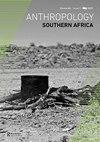Afrikaner networks for volksdiens: Stellenbosch volkekundiges, 1926–1997
IF 0.9
3区 社会学
Q3 ANTHROPOLOGY
引用次数: 0
Abstract
Several critical exposés of volkekunde at Stellenbosch University have focused on dominant figures up to the 1960s but have not sufficiently considered how they engaged with Afrikaner nationalism. This article introduces questions around solidarity, discontinuity and dissent amongst volkekundiges up to the closure of their department. The article uses a network approach to unravel how volkekundiges at the university were entangled with Afrikaner organisations and how their work reflected Afrikaner nationalism. Given tightly knit networks at Afrikaans universities and the appearance of monolithic unity, the limited scope for dissent is of interest. The article follows the development of volkekunde at Stellenbosch in tandem with major changes in the apartheid project for which volkekundiges provided theoretical confirmation of the social categories required to divide and rule black people. Three periods (policy development, implementation, and implosion of apartheid) organise the material, illustrating trends towards solidarity of networks but also (minor) disruptions showing differentiation and dissent. Close connections between academic work and ideological support for nationalist politics characterised the rise of volkekunde at Stellenbosch. This trend also led to the abandonment of volkekunde (then “anthropology”), despite last-attempt retooling of an unsustainable tradition during South Africa’s democratic transition.斯泰伦博斯大学(Stellenbosch University)对民族主义的几次批判性揭露,都集中在20世纪60年代之前的主导人物身上,但没有充分考虑到他们是如何与阿非利卡民族主义打交道的。这篇文章介绍了关于团结、不连续性和不同意见的问题,直到他们的部门关闭。这篇文章用网络的方法揭示了大学里的志愿者是如何与阿非利卡人组织纠缠在一起的,以及他们的工作是如何反映阿非利卡人的民族主义的。考虑到南非荷兰语大学紧密结合的网络和铁板一块的团结,有限的异议空间令人感兴趣。这篇文章叙述了在斯泰伦博斯,随着种族隔离项目的重大变化,“人民志愿团”的发展,在种族隔离项目中,“人民志愿团”从理论上证实了划分和统治黑人所需的社会类别。三个时期(政策制定、实施和种族隔离的崩溃)组织了这些材料,说明了网络团结的趋势,但也有显示分化和异议的(轻微)中断。学术工作与对民族主义政治的意识形态支持之间的密切联系,是斯泰伦博斯大学“人民力量”崛起的特点。这一趋势也导致了对volkekunde(当时的“人类学”)的抛弃,尽管在南非民主转型期间,这一不可持续的传统进行了最后的重组。
本文章由计算机程序翻译,如有差异,请以英文原文为准。
求助全文
约1分钟内获得全文
求助全文

 求助内容:
求助内容: 应助结果提醒方式:
应助结果提醒方式:


